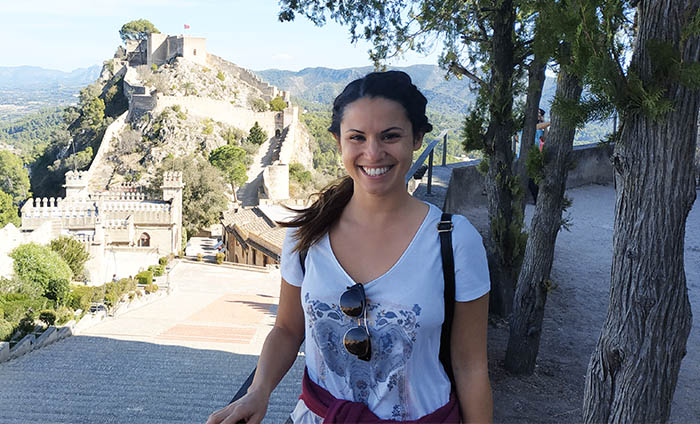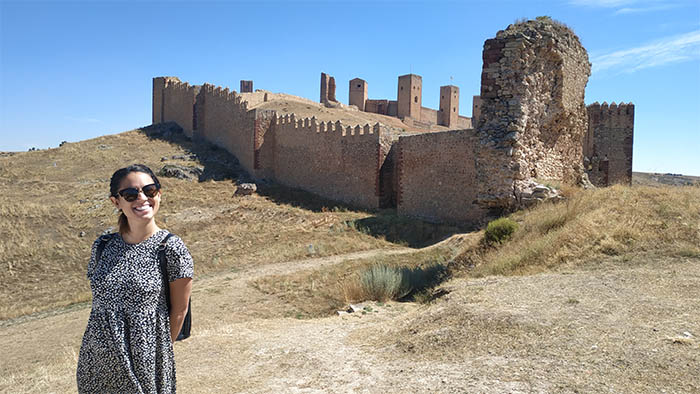I was born and bred in Valencia, which is a lovely sunny and warm city on the east coast of Spain. It’s a big destination for tourists, which gave me the contact I needed with international people. I started to learn languages when I was 8, which was the start of my English journey. I was always interested in learning languages, exploring foreign cultures and real-life interactions with people. I’m an empathetic person and I realised early on in life that if I can work supporting people, to make them feel better, that would be very rewarding.
Growing up I was always topping up my English skills with lessons funded by the government. I come from a blue-collar family, so I’ve always had to find ways of getting funding for lessons to help improve my skills. I also carried out a lot of different jobs to help me along the way and I even worked as a postal worker for a while, which was great because you always got to talk to lots of people. Around this time I started taking advantage of government-funded English language trips to other parts of Spain and further abroad. This made a huge difference to me because I finally got the exposure to native speakers, which is so important when learning languages.
When you’re living abroad you do miss your family but every single day you learn something new about that culture, which brightens my day.
One trip that was a turning point for me was when I went to Toronto in Canada in my early twenties. I stayed with a lovely inspiring woman in her mid-fifties. She helped me to feel comfortable and we shared meals together and had lots of conversations. It was these little interactions that allowed me to settle and I’d strongly recommend to other people to take the risk and go on these types of trips.
However, learning English wasn’t always easy and going abroad often made me realise that my English level wasn’t that good. So I continued to put lots of effort into taking extra-curricular activities.

I first came to the UK when I finished my degree in Psychology at the University of Valencia. I applied for a grant that allows you to spend six months in a foreign country in Europe, and I got an offer to become an intern as a Community Service Volunteer at a small mental health charity in Preston in Lancashire that supports young people in areas such as stress management. I thought I’d only stay six months, but I never came back! Working at the charity was a great opportunity to work on what I’d studied, but my wages were limited and looking back it wasn’t easy.
At first, I found the English language barrier a struggle at times and sometimes I wouldn’t understand fully. The first couple of years I was definitely missing out on information, and little by little, I started to understand things like sayings and idioms. It can really make you feel like an outsider at first, but when you get immersed into the culture such as understanding what’s on television and radio, I guess that’s when you feel settled.
After my first year living in the UK, I decided to take an IELTS test out of curiosity, to get a sense of how my level of English had improved. At that time, I was still thinking I would go back to Spain soon, so I was hoping to go back better equipped and with a certificate in my hands that would help me get better jobs or further education opportunities. I started preparing for the test by studying and watching videos online – I found YouTube particularly useful – and then took the test, which showed a good level of English. My life changed once again, as following the IELTS results I decided to apply for a master’s degree. I got a place at the University of Cumbria in Lancaster to study a Master of Science in Psychotherapy CBT and then remained in the UK for a little longer.
Once my master’s degree finished, I started working as a psychotherapist for the NHS. I like to keep on learning and did another master’s degree in Intercultural Communication in Cambridge, whilst I was working full time in the NHS. The beauty of doing the master's was learning about how cultures interact, and how certain languages interact. This encapsulated all my passions, but don’t get me wrong, it was tough balancing work and study.

I’m back in Spain now but I’m still working for two UK-based companies as a CBT psychotherapist. I’m looking forward to going back to the UK as the positive side of being abroad is that you’re constantly learning and interacting, which is intrinsic with me.
I’ve never had a mentor, but looking back I do have my parents to thank as they are my inspiration and they’ve always worked hard to provide for us. My mum moved from a small village in the east of Spain to the city as a single mum in the 1970s, which wasn’t easy. She did that in her early twenties, and interestingly I went abroad at the same age. She took a risk, an opportunity and it paid off as she met my hard-working dad and they formed this lovely family of five that we now have. I can see why I have always been persistent, despite the struggles at times.
When you’re living abroad you do miss your family but every single day you learn something new about that culture, which brightens my day. That’s what kept me in the UK for so many years and that’s why I’m going back.
And thanks to a sense of adventure and the work ethic from my parents, I know I’ll be OK on the next leg of my journey.